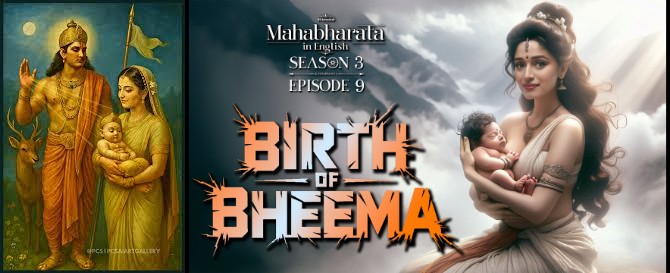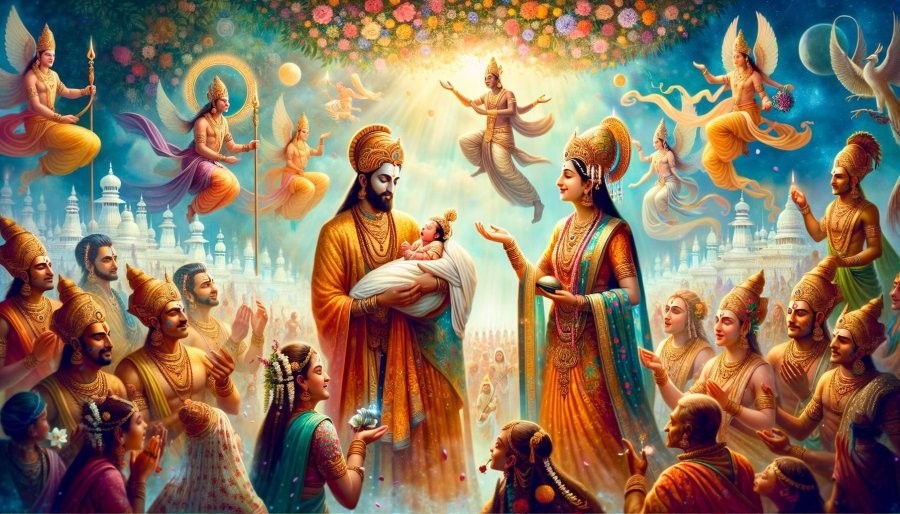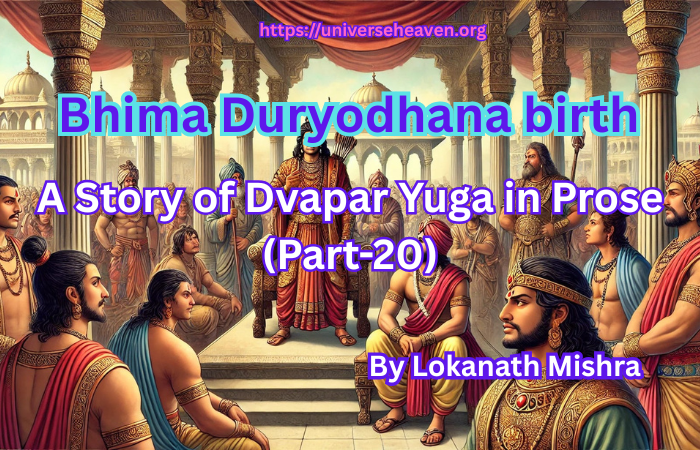A Story of Dvapar Yuga in Prose (Part-20)
By Lokanath Mishra
While bliss reigned in Mathura , in Hastinapura, the royal city of the Kuru dynasty, many significant events were unfolding — events deeply intertwined with Krishna’s future destiny. Since the path of Krishna’s karma was to be linked with Hastinapura, it is essential for us to remain aware of the changes taking place there.
We have already spoken of events up to the birth of Yudhishthira. Let us now proceed further.

The Birth of Duryodhana and His Brothers
By the blessings of Sage Durvasa, Queen Gandhari of Hastinapura had given birth to a hundred sons. After their birth, the venerable Vyasa Deva arrived to bless them. He took each child in his hands, beginning with the eldest, and offered his benedictions.
To Duryodhana, the firstborn, Vyasa granted a boon:

“May you possess the valor of a thousand lions.”
But in that very moment, the infant Duryodhana kicked Vyasa in the chest with his tiny foot. The sage winced in pain and grew stern.
He declared:
“Because you struck me in arrogance, your thousandfold strength shall be reduced to that of a single lion. The very foot that struck me shall one day be crushed in battle. And since you have displayed aggression from birth — and are born of Durvasa’s fierce boon — you shall be known by the name Duryodhana, the ‘difficult to subdue.’”
Thus the names of Dushasana and the other Kauravas were also given thereafter.

The Birth of Bhima
Let us now turn to the time of Bhima’s birth.
King Pandu, with his queens Kunti and Madri, was then residing upon the lofty Shatashringa Mountain — not an ordinary peak, but one where celestial beings themselves were said to roam. The mountain bore a hundred proud summits, gleaming beneath the heavens.
When Bhima was born and his body touched the ground, the great mountain began to tremble and sink as though unable to bear his weight. But the gods quickly upheld it in their divine strength.

It was a stormy, dark night. Bhima’s first cries echoed across the cosmos, shaking the very firmament. Hearing this, a fierce tiger approached, drawn by the sound, intending to devour the newborn child.
Terrified, Kunti climbed a nearby tree with her infant. But as the tiger came near, baby Bhima struck it with a single kick — and the beast fell dead at once.
At dawn, King Pandu arrived and Kunti descended with her son. As soon as Bhima saw his father, he waved his hands and legs and cried even louder. One of his kicks struck the mountain so powerfully that one of its peaks broke off.
Angered, the spirit of Mount Shatashringa cursed the child, saying:
“Though you are born with immense strength, you shall lose your first battle.”
Hearing this, Kunti became enraged and said:
“You have cursed an innocent infant! I curse you in return — that your body shall one day be torn into pieces by the people!”
Fearing further wrath from Kunti, the mountain spirit repented, pacified her, and offered a boon to Bhima:
“In your second battle, you shall remember me — and you will possess the strength of a hundred lions. None shall ever defeat you.”
Bhima’s Childhood
Upon that divine mountain, Pandu dwelt peacefully with Kunti and Madri. Yudhishthira was gentle, calm, and kind-hearted — but young Bhima was a handful!

When Kunti and Madri went to wash clothes after cooking, Bhima would stealthily eat the half-cooked food. The mothers were puzzled — no matter how much they cooked, the food would always disappear!
One day, in his childish greed, Bhima ate everything that had been prepared. None could imagine how such a small child could consume so much.
When King Pandu awoke and saw what had happened, he was astonished — and furious. Bhima, frightened, fled at once, with Pandu chasing behind him, sword in hand.
As Pandu pursued him, the god Agni — the Fire God — took the form of a Brahmin and followed closely, concerned for the boy. Kunti and Madri too ran behind, calling out.
After a long chase, Bhima slipped upon a rocky ridge and fell into a stream below. Pandu reached him, grabbed his hair, and raised his sword to strike — but the Brahmin appeared before him and stopped him, asking:
“Why such anger, O King?”
Pandu replied,
“For years I have offered food to the gods, sages, guests, and ancestors before eating. I shall not break that sacred vow because of this child’s greed!”
The Brahmin smiled and said,
“This is but a child, O King. The morsels eaten by a child never displease the gods or ancestors. They, in fact, delight in such innocence.”
Still unconvinced, Pandu frowned. Then, the Brahmin revealed his true form as Agni Deva — the God of Fire. He freed Bhima from Pandu’s grasp and said:
“Do not worry about who shall feed him. I grant him a boon: this child shall master every art of cooking — Gauri, Sauri, and Nala styles alike. Whatever food he places upon the fire shall instantly become delicious and nourishing as ambrosia. Yet, he shall never find satisfaction — neither in eating nor in battle.”
Saying this, Agni disappeared.
⸻
Bhima’s Nature
From childhood, Bhima knew no difference between righteousness and wrongdoing. For the Kshatriyas, the art of war was meant to be guided by both shastra (sacred knowledge) and astra (weaponry). Bhima cared only for the latter.
As the saying goes:

“In him, there was not a grain of mercy or illusion —
and if one sought his refuge, he struck with double might.”
It is said that in her previous birth during the Treta Yuga, Kunti was none other than Anjana, the mother of Hanuman. Though the ages change and the world’s virtues fade, echoes of divine lineage persist —
for what are Hanuman and Bhima, if not two faces of the same boundless power:
the ocean of knowledge and strength,
the giver of wisdom and victory,
the destroyer of sorrow,
the possessor of the eight siddhis and nine treasures,
the eternal celibate,
and the one worshipped in all three worlds.
And thus was born Bhima Sena — adorned with immense might and complex character, a mirror of Hanuman in human form.
⸻
( to be continued)
A Story of Dvapar Yuga in Prose (Part-19)
A Story of Dvapar Yuga in Prose ( part-18)
The Story of Lord Venkateswara – The Eternal Protector of Tirumala


Pingback: India International Conference & Felicitation Ceremony – 2025 Held in Puri - UniverseHeaven
Pingback: A Story of Dvapar Yuga in Prose ( part-21) - UniverseHeaven